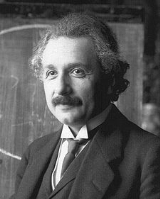
who developed the theory of general relativity
, effecting a revolution in physics
. For this achievement, Einstein is often regarded as the father of modern physics
and one of the most prolific intellects
in human history. He received the 1921 Nobel Prize in Physics
"for his services to theoretical physics, and especially for his discovery of the law of the photoelectric effect
".
1879 Albert Einstein is born in Ulm, Germany.
1900 Einstein graduates from the Swiss Polytechnic University in Zurich, Switzerland.
1902 Einstein takes a job as a clerk in the Swiss Patent Office.
1905 Albert Einstein reveals his Theory of Relativity (special relativity).
1905 Albert Einstein publishes the article "On the Electrodynamics of Moving Bodies", in which he introduces special relativity.
1905 The physics journal Annalen der Physik published Albert Einstein's paper "Does the Inertia of a Body Depend Upon Its Energy Content?", introducing the equation E=mc².
1905 Albert Einstein's paper, ''Does the Inertia of a Body Depend Upon Its Energy Content?'', is published in the journal "Annalen der Physik". This paper reveals the relationship between energy and mass. This leads to the mass–energy equivalence formula ''E'' = ''mc''².
1916 Albert Einstein publishes his general theory of relativity.
1919 Einstein's theory of general relativity is tested (later confirmed) by Arthur Eddington's observation of a total solar eclipse in Principe and by Andrew Crommelin in Sobral, Ceará, Brazil.
1921 Albert Einstein is awarded the Nobel Prize in Physics for his work with the photoelectric effect.
A happy man is too satisfied with the present to dwell too much on the future.![]()
I am by heritage a Jew, by citizenship a Swiss, and by makeup a human being, and only a human being, without any special attachment to any state or national entity whatsoever.![]()
I have also considered many scientific plans during my pushing you around in your pram!![]()
Make a lot of walks to get healthy and don’t read that much but save yourself some until you’re grown up.![]()
Dear mother! Today a joyful notice. Hendrik Lorentz|H. A. Lorentz has telegraphed me that the English expeditions have really proven the deflection of light at the sun.![]()
We may assume the existence of an aether; only we must give up ascribing a definite state of motion to it, i.e. we must by abstraction take from it the last mechanical characteristic which Lorentz had still left it.![]()

